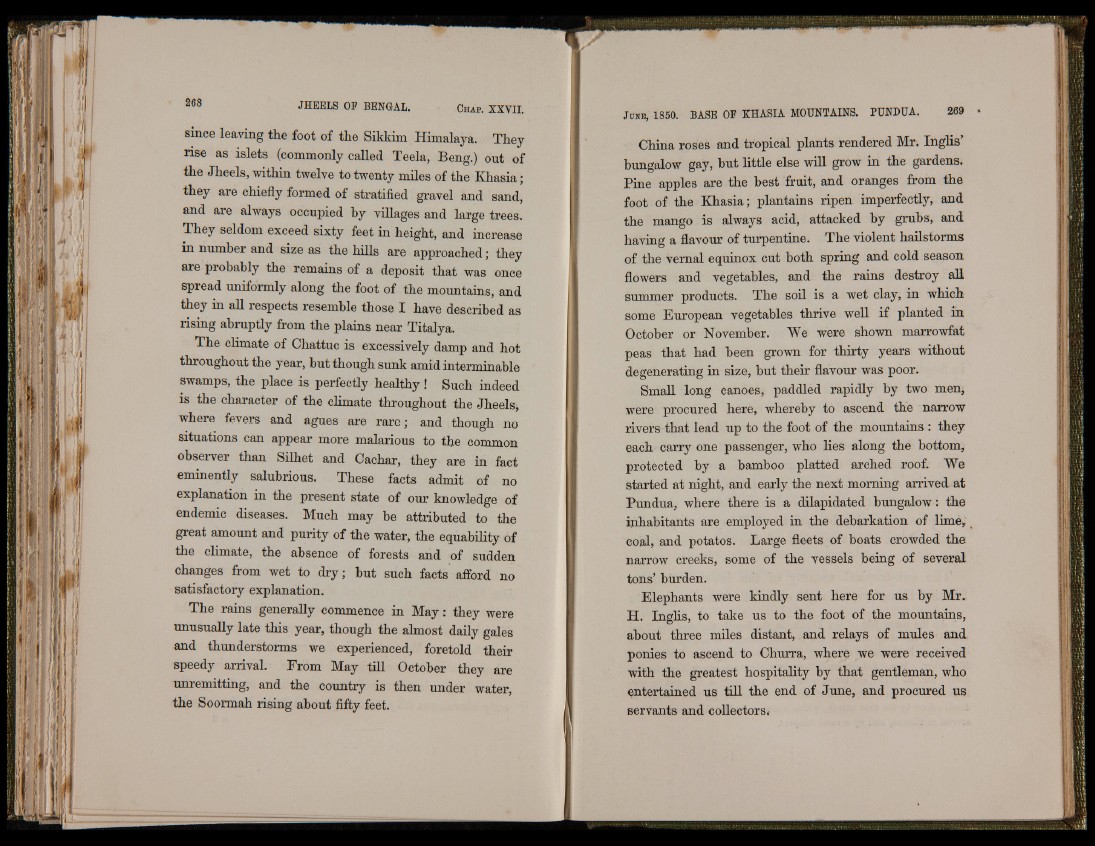
since leaving the foot of the Sikkim Himalaya. They
rise as islets (commonly called Teela, Beng.) out of
the Jheels, within twelve to twenty miles of the Khasia;
they are chiefly formed of stratified gravel and sand,
and are always occupied by villages and large trees.
They seldom exceed sixty feet in height, and increase
in number and size as the hills are approached; they
are probably the remains of a deposit that was once
spread uniformly along the foot of the mountains, and
they in all respects resemble those I have described as
rising abruptly from the plains near Titalya.
The climate of Chattuc is excessively damp and hot
throughout the year, but though sunk amid interminable
swamps, the place is perfectly healthy ! Such indeed
is the character of the climate throughout the Jheels,
where fevers and agues are rare ; and though no
situations can appear more malarious to the common
observer than Silhet and Cachar, they are in fact
eminently salubrious. These facts admit of no
explanation in the present state of our knowledge of
endemic diseases. Much may be attributed to the
great amount and purity of the water, the equability of
the climate, the absence of forests and of sudden
changes from wet to d ry ; but such facts afford no
satisfactory explanation.
The rains generally commence in May: they were
unusually late this year, though the almost daily gales
and thunderstorms we experienced, foretold their
speedy arrival. From May till October they are
unremitting, and the country is then under water,
the Soormah rising about fifty feet.
China roses and tropical plants rendered Mr. Inglis’
bungalow gay, but little else will grow in the gardens.
Pine apples are the best fruit, and oranges from the
foot of the Khasia; plantains ripen imperfectly, and
the mango is always acid, attacked by grubs, and
having a flavour of turpentine. The violent hailstorms
of the vernal equinox cut both spring and cold season
flowers and vegetables, and the rains destroy all
summer products. The soil is a wet clay, in which
some European vegetables thrive well if planted in
October or November. We were shown marrowfat
peas that had been grown for thirty years without
degenerating in size, but their flavour was poor.
Small long canoes, paddled rapidly by two men,
were procured here, whereby to ascend the narrow
rivers that lead up to the foot of the mountains : they
each carry one passenger, who lies along the bottom,
protected by a bamboo platted arched roof. We
started at night, and early the next morning arrived at
Pundua, where there is a dilapidated bungalow: the
inhabitants are employed in the debarkation of lime;
coal, and potatos. Large fleets of boats crowded the
narrow creeks, some of the vessels being of several
tons’ burden.
Elephants were kindly sent here for us by Mr.
H. Inglis, to take us to the foot of the mountains,
about three miles distant, and relays of mules and
ponies to ascend to Churra, where we were received
with the greatest hospitality by that gentleman, who
entertained us till the end of June, and procured us
servants and collectors*